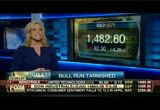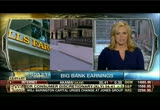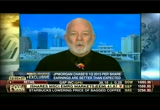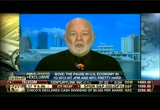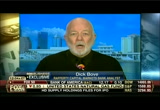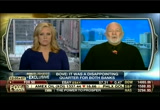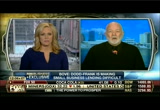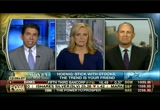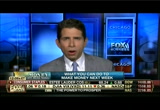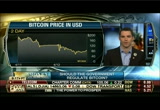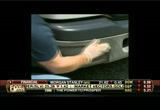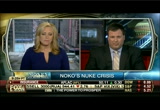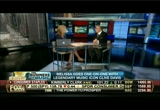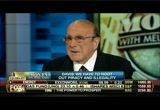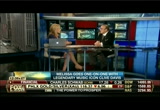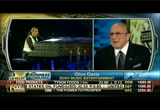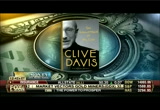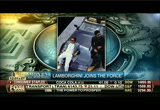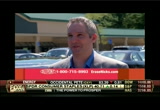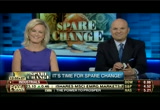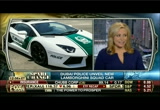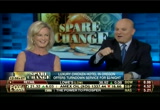tv MONEY With Melissa Francis FOX Business April 13, 2013 12:00am-1:00am EDT
12:00 am
the government is out of control. neil: i wish we had more time. one case where shrinkage would not be a problem. that will do it. have a g>> bye now. ♪ melissa: i'm melissa francis. here's who made money today, mcdonald's ceo, donald thompson, the 2012 exe sages soared to $13.8 million, more than triple what he was paid in 20 # 11, and thompson earning his keep with stocks up 17% this year. very nice. losing money and shirts, today, gold bond. technical selling made gold nose dive into bear market territory losing $63 an ounce selling at the lowest level since july of 2011. wow. you know who is all "money" today? china, an 8th grader, 14 years
12:01 am
old, the youngest kid to play in the masters shooting 4-over-par, and currntly projected to just make the cut for the weekend, but after ridiculous slope play penalty, let the endorsement awards begin. up real. when they say it's not, it's always about "money." ♪ melissa: today, two of the biggest banks kicked off the bank earning season, jpmorgan chase reported first quarter profits better than expected, but shrinks revenues spoke volumes about the state of the recovery and what the rest of earning season brings. here to break it down, a fox business exclusive, top analyst of comal markets. dick, thanks for coming on the show. get to it.
12:02 am
i don't want to waste in the time. the biggest surprise to me was that the slow down in the economy hit both. i think you could see that. did you see evidence of that, and was it surprising to you? >> it was surprising, and it was very clear. in other words, the economy did pause in the first quarter this year, and that pause was showing up in the bank, you know, loan volumes. jpmorgan's volumes were weak on the consumer side, particularly, credit cards, seasonably weak in the first quarter, but was weak in the case of wells fargo. you saw it on the mortgage side and in the mar gyps, but what yourallsee in both of the banks is that if the consumer doesn't step up and go out and borrow some money, it's difficult for them for the rest of the year to show the type of earnings performance that they would like. melissa: yeah, extend that, it's hard for either of them to do better. if the economy doesn't pick up; right? >> exactly. now, fortunately, i happen to
12:03 am
believe the economy will pick up, so i do believe that these companies will start to see some better loan growth as the year goes on. i think that housing, autos, i think that capital spending, i think that the -- if you will, the expansion of the monetary system here and all around the world, all of that is working in their favor, so even though, this, in my view, was a disappointing quarter out of both of the banks, both of those banks should recover. melissa: why? what makes you think the economy's picking up here? >> well, you know, housing is looking pretty good. i think that, you know, essentially, as the prices of houses go up, there's a positive impact on the banks because they own all of this disstressed housing. they own all of this disstressed land, and the value of the properties go up, and that shows up in bank earnings. i think it'll be 16 unit auto year, meaning there should be a lot of auto loans. we are seeing year over year, 12% increase in, you know, commercial loans, and that means
12:04 am
that the commercial sector is moving better, and, of course, you know, if the fed continues to print money, if the japanese continue to do what they are doing so that money flows to the united states, and if the europeans, you know, throw their money to the united states, then, basically, you're driving the deposits in the system higher, and the banks make money on deposits. melissa: drilling down on more of the sectors, small business lending was weak. that makes me nervous about the economy driving the employment. did you see that and does that improve with the rest of the outlook you talk about? >> well, you know, i think that the dodd-frank act makes it much more difficult for banks to lend to small businesses, and i think, if you look at what's happened to small business lending since the dodd-frank act was passed in july of 2010, you'll see that, you know, big businesses have seen significant increase in their loans, and small businesses have seen meaningful decreases in their loans, and in other words, the
12:05 am
banks shifted their money away from small businesses to big businesses, and i'm not sure that's economically driven. i think that a lot of it is a change in something called the risk waitings making it more difficult for banks to lend money to small businesses. melissa: another thing, if you look at jpmorgan, in particular, fixed income and investment banking good for them. do they keep it going, was it look, or a one-time thing? >> well, you know, first quarter of the year tends to be a very good quarter for trading, and you really don't expect the next three quarters to equal what you see in the first quarter, so i don't see how either one of these companies can maintain the trading volume showed in the first quarterment i think that definitely goes down throughout the year. what is working in their favor is investment banking, particularly for j pmorgan. jpmorgan is number one on the announced mna deal, and they have not got paid on them yet. in other words, second and third
12:06 am
quarter, they'll see payments kick in on big deals announced last january, and that should, if you will, offset weakness you'll see in trading. melissa: dick, i can't let you go without asking for a reaction in the shareholder letter talking about we could see rates rise rapidly more than we've seen in a long time. i misquoted because it's not in front of me, but you know what i'm talking about. was it surprising to you? did you agree with that? >> well, i agree with it. i think while the federal reserve claims it can control interest rates and inflation, they've never done it, and, therefore, my guess is that in 2014, you will see inflation picking up meaningful, and interest rates moving up meaningfully, and, initially, that's meaningful to bank earnings, but long term, harmful. melissa: so smart, we appreciate your time and insight. >> thank you. melissa: markets down slightly on disappointing reports today. first word of an unexpected drop
12:07 am
in retail sales for march, and, plus, u.s. consumer sentiments tumbled to a nine-month low this month. take heart, how to make money next week. we got fox news contributor and portfolio manager, and the president of american wealth management, great to have you here. what do you think of what you heard from dick? did it make you want to buy or sell something? >> made me want to stick with the bank stocks, actually, that dick sounded cautious on. i mean, names like wells fargo, which he mentioned, this is one of the stocks that they are not too distant past at a 52-week high, bullish for the market, but dick hit the nail on the head when it comes to rising interest rates. the biggest surprise in 2014, but stick with the stocks, the trend is your friend, and for now, trends in stocks is higher. melissa: another mention was the influx of money from other countries coming into the u.s., both by real estate and also to
12:08 am
buy stocks. do you agree with that assessment of what's going on? do you think that trend continues and benefits the market? >> clearly, it does. you know, we have problems. we knew there were problems in europe, other parts of the world, you know, america's still a great place to invest, and i think the investors around the world recognize that, but there's a place to put risk capital. if you're going to invest, invest in the u.s.. melissa: what do you think of earnings season so far, and what do you look forward to next week? >> well, you know, i'm looking forward to continuation of, frankly, melissa, what was seen in the previous week. you want to know the weather next week, look at the week past. this trend of stronger stocks k weaker commodities, you know, more than any earnings today, that i think massacre in gold really exemplifies this rotation you see now. back into stocks, and out the safe haven assets like gold. i don't think that continues. i'm short gold expecting prices fall further below $1500 an ops.
12:09 am
melissa: great point. was that the most trading event of the day, gold went down in the bear market territory, just so many things, impacts so many things here in the market. what do you think of that move? >> yeah, i thought it was significant. actually, it was shocking. consider it could be a con pitchlation in gold and maybe in the short term, it's going to bounce into next week before it falls further. melissa: interesting. so, john, set me up for next week and next week's trade. what do you buy or sell? >> well, you know, one area i've been focusing on is these floating rate funds, names like bkln, flrn, flot, and i known them in the fund. they are short term bank loan funds whose rates rise with interest rates. we saw the bond market go limit down, i believe, three times, so that shift is happening towards
12:10 am
higher rates, and floating rate funds are to be a great place to hide as short term rates climb higher. >> what do you buy next week? >> you know, i think of the next three to five days as probably a way to be cautious, but, really, our quantitative model within the tactical advantage is overweight in large cap stocks, market narrows, and large caps is the place to be, and we like dividend producers. melissa: what do you think of the picks? >> i don't buy stock because of the dividend. it gets cut. people bought pharms in the 2000s, bought gm. what i look for is strength more than anything. strong stocks, strong outperforms weak ones. i think he hit the nail on the head. you get 3m, e bay, walmart, mcdonalds, all at 52-week or all time highs, bullish, and likely to be a trend.
12:11 am
melissa: what do you see next week? >> shift from small cap stocks, stay away from foreign and emerging markets. wereally focusing on large caps, blue chips, away from small and mid cap stocks. melissa: thanks for the ideas, gentlemen, have a great weekend. >> thank you. melissa: fuel gauge report. weak u.s. economic data hammered oil futures, lowered prospect crude tumbling to a five week low. today's oil selloff could bring good news to drivers, though sparking another decline in gasoline futures going to a three month low over three days, 14 cents a gallon. avoiding today's commodity crunch, natural gas futures. the diminishing supplies and cold weather forecasts sent them rallying to the highest level since late july of 2011. all right, coming up on "money,"
12:12 am
we are still on the bandwagon, but when it trades like this, you can practiceically hear regulators' mouthsatering. time for the government to step in? plus, when you have clyde davis on the show, play the famous music he produced. he's going to be here to talk to us about what's ahead for the business of music, and until then, enjoy the greatest songs he's behind. more "money" straight ahead. ♪ hoo-hoo. hoo-hoo...hoo-hoo. hoo-hoo hoo. sir... i'll get it together i promise... heeheehee. jimmy: ronny, how happy are folks who save
12:13 am
12:16 am
♪ melissa: all the rage now, the virtual currency on wild ride as trading volumes spiked. bitcoin traded at $134. it shot to a high of 626 dollars, and now down to $91. a lot of volatility. some call for regulation, but bitcoin was created to be open sourced, decentralized. the government steps in to regulate it, doesn't that dpe
12:17 am
feet the purpose? joining me now is large roger, ceo of bitcopy store, online electronics retailer that only accepts bitcopy, can't be easy, and a professor of finance who does think regulation is needed. thank you for joining us. james, starting with you. what do you think of this madness? >> well, i think bitcoin turned into a massive multiplayer online game where speculators are trying to out speculate each other. it's not what we're looking for in a monetary system. melissa: mogger, what do you think of that? an online game? it does have a game feel to it. >> people speculate on bitcopy, but if they are, it's their money. it's not the government's business. people have 100% control over their money, first time in the entire history of the world in which something like that existed, and it doesn't matter what country they are in or where at in the world, they send and receive money with anyone else anywhere in the world, and there's nothing anyone can do to
12:18 am
stop it. melissa: roger, people who have it don't have control because the value, look at the chart, it's sinking and skyrocketing every second. you don't have any control. >> well, that's -- if you look at it, yes, it's down from a couple days ago, but it's up more than 5 00% since the beginning of this year, up several hundred percent last year as well and the year before that. you know, bitcoin is a voluntary ing,se it if you want to, if not, you don't have to, use the dollar. nobody forces it. if you want to, use it. millions of people choose to use it because they see it's better than other options available to them. melissa: james, what do you think? those points makeceps. >> well, in the 19th century, with had a monetary system outside the control of government called the gold system, and we discovered it created a financial system so brittle it broke with great recessions every five to ten years, and we also discovered that the money supply didn't grow to fit the economy, so this
12:19 am
notion that, oh, it's outside the control of government, we've tried it. been there, done that. as the old quote says, if you don't learn theless sops of history, you repeat it. melissa: james, the point roger made is that is when systems were dependent on those currencies. this is a tiny fraction of the economy, there's people making a ton of money in it now and losing their shirts in it. that's why it's getting the attention, but you can use dollars if you want to, and, you know, it's not obligatory. i don't know. maybe it's not a big deal. james, what do you think? >> right. i agree with that in that it's voluntary. if other people want to go and speculate on some japanese trading card exchange, hey, go for it. however, don't confuse it with a real monetary payment system. it's a game. melissa: roger, you only take bitcoin exclusively on your
12:20 am
online site. how's it work? do you translate them? do you convert them back to dollars? >> i'm confident that bitcopy is the most important invention in the entire history of the world since the interpret, and because the supply is limited, the price goes up. every order we get on bitcoinstore.com, i hold the coin, i trust them more than dollars, euro, or yen. all the crazy things government do to debase currency, and with bitcopy, it can't happen, protected by the laws of math, not the laws of men. we don't know what the u.s. government do with the dollar tomorrow or the europeans with the euro, and japanese printing yen as well. with bitcoin, i don't have to worry about that. i know how the protocol behaves, and i don't have to trust any government politicians somewhere else with my money. i have complete over what i do. melissa: it's an adamant position. >> yeah, right. melissa: james, who would have jurisdiction over this?
12:21 am
i mean, really, because you have to think that as this is going op, you see media about it, the prices all over the place, they say this is mine to regulate, is it the treasury coming in? there's a note saying they would oversee the exchanges? what do you think could happen legally? what makes sense? >> well, the federal reserve has jurisdiction over payment processers, so to the extent that payment processers step into the picture, they could be regulated by the fed, but the important thing is force and fraud. we want to make sure that we don't have criminals in the system here, and this notion that this computer algorithm is hacker proof or that it really is limited, when we don't know who created this thing. melia: yeah. >> really, it's too shadowy, to speculative, and as long as people play games offshore, let them, but don't confuse it with a real monetary system, because
12:22 am
it's not. melissa: thank you to both of you, great insight and great debate. we appreciate both your time. >> thank you. >> thank you. melissa: so it is our "money" question of the day. is it time for the government to start regulating bitcoin? a mix today. i loved this twitter response, "i call it the abc current, no assets, no borders, no controls, what could possibly go wrong? " we want to hear from more. like us on facebook.com or follow me on twitter, and feel free to send me your bitcoin. i'm collecting them. next on "money," north korea says tokyo is target number one, and john kier rei tells korea to back down or else, but it may have a nuclear missile up its sleeve. new details op the standoff's stopping turn. plus, music stars and then there's music legends, clive davis launched careers of whysny houston and countless others.
12:23 am
12:27 am
melissa: no matter what time it is, "money" is always on the move, and the blood bath for gold prices getting worse since the day progresses. gold settled at $63 an ounce, and the selloff is accelerating in after hours, electronic trading. gold down nearly $89 an ounce, a wipeout there. all right. the situation in north korea is heating up. yesterday, a report by the defense intelligence agency found that north korea probably does have the capability to make a nuclear weapon small enough to be delivered by a ballistic
12:28 am
missile. japan, shoring up its missile defense system got a warping from the north koreans they better be the rogue state -- they would be the rogue state's first target if they use a nuclear weapon. today, secretary of state john kerry is in seoul assuring alies we'll defend them and warning north korea there's major consequences if they launch a missile. meanwhile, what are creeps -- koreans doing? dancing in the streets preparing to celebrate the birthday of their great leader, so what should the u.s. response be to this? the ceo of diligent innovations, thank you for coming to the show, a lot of information there. let's back to the first bit, what do you think of the report that came out? >> sure. the first thing to remember, and i'm a proud former naval intelligence officer, but when it comes to secretive societies and weapons of mass destruction is we're wrong almost every time. everybody knows we were wrong the second time about iraq and
12:29 am
wmd in 2003. most people forget that, you know, we were wrong in 1991 thinking there was not a program at all, and turns out it was a size l program. the d iring's a does the right thing says there's a chance they have a weapons system. the other thing we have to remember is that whether or not they're able to minturize a warhead, put it on a missile to be launched in a traditional military strike, talking about north korea, be worried about other attacks, submarines, cargo containers, airplanes. missiles are not the only way to deliver the weapons. >> okay. they have singled out japan as the target. that was the big piece of information in there. what do we do about that? is there an appropriate response? >> they sing the out japan because, you know, they are not going to attack china, and, you know, they made such rhetoric with south korea, they look at the map for another target. we are doing the right things in terms of putting in place naval
12:30 am
ships to shoot down missiles telling the allies we'll engage. if there's good news is at the tactical level. they are not mobile idahoing troops so we don't believe they are looking for war, but it strengthens the point here that we don't want to be in a 10-20 year cycle of this guy wratch ets up the rhetoric, buy him off and bribe him. he's a bully. melissa: it is the cycle everyone feels we're in. how do you stop that? >> the major mistake we make is, you know, we have an adversary relationship with him whether we want to or not. we almost completely abdicated our role to china. the administration's atements and senator mccain on the republican side, what you hear is everybody say, well, well hope china steps up and does what we want them to do. that's foolish and naive. melissa: what do we do? >> multilateral conversations, six party talks getting together with japan, south korea, and other folks for a regional
12:31 am
solution together with the u.s. leading, not saying we hope china takes care of it. it's the only way to do it, pressure them, and ultimately, frankly, what we have to do is pressure for a coo inside the country and topple the regime. he's the third in a line of madmen in the family that drove the country into utter ruin. melissa: not any luck with that and hasn't turned out in other countries when we force a coo. thank you so much for coming on. >> sure, thanks, melissa. melissa: next, arguably the most successful music produce europeans in -- producer in history launching the career of legends like houston, bruce springsteen, and who proves the next big "money" stars, and clive is here to tell us what's ahead in the business of music. flavored vodkas from president obama's budget, absolutely bizarre taxes coming to light. we have the details, piles of "money" coming up.
12:35 am
12:36 am
it's increased since 1999. music is always evolving, but one man always stayed one step ahead. he launched the careers of bruce spring steen, franklin, whitney houston just to name a few, the one and only music legend and power force, clive davis, a new book out, "the sound track of my life," i love it, it's fantastic, but i'm sure you heard that everywhere. it's been on the new york best seller list for seven weeks now. wow, congratulations on that. >> it's a thrill for me. melissa: amazing. i hardly know where to start, but i want to start with the business of music because we talk about the revenues there a bit. it seems like every time there's a new trend in the way that we're all consuming music, it changes. there was itunes. look at streaming, is huge, generating $1.2 billion in royalties last year. what is the future hold for the business of music? how do you see it changes?
12:37 am
>> well, first of all, i'm very optimistic, number one, because when new technology comes, you wonder about the underlying product, and is it viable? music is a part of everybody's life. number one, you know that music will be here forever. melissa: great point. >> and secondly, i was very hardened at the turn about this last year because we've really had to deal with the piracy problem. we really had to deal with the slowness admittedly of the record industry to get with the digital revolution and provide a legal alternative, but piracy has got to be rooted out. the creative people in our music and in our world really have to be compensated so we have to rule out piracy. melissa: getting better or worse? >> it's a major problem, and i know more work has to be done. we are not sitting back on this because music is more vital than
12:38 am
ever, really. melissa: in the digital age, has where the revenue comes from changed? has it shifted? performers say now they make more money on tour. has the business model shifted? >> there's been a shift, and no question live performances are a major part of the artists' revenue, and that album sales have ben -- been affected by the piracy, no question, but i'm hard ped that with adele's 21 million worldwide sales, new orders are not just, you know, would be electronic world becoming so important, they are not really led to the creative edgy artists that we need to keep an industry of music healthy, but, today, with mumford and sons, lumineers, and i just put the grammy part of it i hold the
12:39 am
night before -- melissa: a grammy party, come on, it's the party of year. >> so this year, i want to show the vitality of music putting these new orders along, of course, doing a duet with the great gladys knight and jennifer hudson to show the new great voices with the all-time great voice. melissa: yeah. i'm enjoying the book so far. it is so -- it feels like you are talking to me when you write. the writing style is you telling a story. it's especially exciting to read stories about you finding artists, how you discover them and cultivate them. how do you balance making them the most profitable they could be because it's a business while trying to keep them unique and what made them special in the first place. do you balance that? >> the music comes from the artist. i don't make them unique. i'm not street talking. melissa: how do you preserve it
12:40 am
then? >> well, firstly, for example, whether it's houston or keys, i mean, in the case of whitney, she did not write her own material, so there was, of course, the question of really two years going and showcasing her and having every writer, a great writer with the track record to see her major new talent, attracting michael and attracting some great writers to come up with "save l -- "saving all my love for you," and the son that defined her era. keys, a young renaissance woman who writes her own material, arranges, produces, so we waited the same two years, but for alisha to refine the material, she was a teenager, and to say i'm ready, and there it was a question of how do you spread the word? every time i gave the spech, i would put her op, and she -- you
12:41 am
create those opportunities, the ultimate being the oprah winfrey show, taking her by storm, and by the time her album came out, she had to go to number one. melissa: yeah, you read again and again in the book about young artists who want to work with you, and you made so many careers. what do you say to the young artists out there who don't get the experience of working with you? what's the advice you would give them? >> well, you know, the advice is that they got to refine their craft. i mean, it's really comes from the add -- the artist, and if they are a writer, work on the material, get that material heard. in the event of coming from the voice, then you got to get somebody that helps you come up with your signature songs that will define you. melissa: work on your craft. i like that. another thing that's magical about you is reviving careers.
12:42 am
whose career do you want to revive? who do you think you could help? >> you have to be careful -- in the revival, you know, i had vast experience. equal to that of a discovery, and provide them when it's ron stewart or santana, or the great american song book. i love the old-time -- all-time talents, but she never peaks, but if she does peak, mary j. blige, i would always think is an all-timer who should appeal to every generation of music. melissa: clive davis, "sound track of my life," as if i need to public because it's selling like hot cakes. there it is on the screen. thank you so much for coming on. >> you made a pleasant, thank you so much. thank you. melissa: thank you so much. coming up, president obama's cooking up all kinds of tax increases in the new budget, but when you peel back the layers,
12:43 am
looking to schwas -- squeeze weird thing for extra bucks. wait until you hear this. at the end of the day, it's all about "money" and clive davis. ♪ we went out and asked people a simple question: how old is the oldest person you've known? we gave people a sticker and had them show us. we learned a lot of us have known someone who's lived well into their 90s. and that's a great thing. but even though we're living longer, one thing that hasn't changed: the official retirement age. ♪ the question is how do you make sure you have the money you need to enjoy all of these years. ♪
12:47 am
♪ melissa: so just as you wrap up taxes for this year, brace yourself for more. in the new budget proposal, president obama does what he does best, increases your taxes. sure, he goes after the usual culprits like itemized deductions and cuts for oil companies, but did you know your appletini is at risk? oh, yes. there's more bizarre new taxes. maddie, american for tax reform, what struck you as bizarre in this? >> well, besides the risk of your appletini, there's the slew of taxes coming down the pipe at the obama budget were enacted. you know, the iteresting thing you launched the segment off is this is not the usual list of boogyman that obama goes after. it's the corporations and
12:48 am
wealthy, but in this budget is a list of regressive tax hikes that hit the lower and middle income workers in the country. the tobacco tax in his budget proposal, that's supposedly going to fund education programs is regressive. this is something that, of course; the president had campaigned on in not raising taxes on anyone making over $250,000 a year, and took 16 days into his presidency to sign the first tobacco tax increase into law. now we're at this again that president obama's going back to the same grab bag of tax hikes, not only on the wealthy, but middle income earners. melissa: tobacco is a big one, and dennis talk about how it overwhelmingly hit low income americans, more likely to smoke, turns out, so it hilts the people who can't afford it the most. flavored vote cay, -- vodka, seriously? >> president obama talks
12:49 am
constantly about a grand deficit, and come together for a big budget plan. look at the budget proposal. he hammers certain tax treatment in the code to raise revenue for his deficit reduction plan, but is the country hanging in the that lance because of flavored vodka? the answer is no. what you look at is a budget plan that introduced more complexity to the tax code, not less, in order to fund government, not to do anything about debt and deficit. melissa: does it fund more government because with the lot of these, they don't generate that much revenue. they are good for headlines and for getting people rile up, but they don't generate revenue. >> exactly, the other thing about the budget that includes taxes like taxes op tobacco and that sort of thing. it's a shrinking base. they are taxes that when applied, excise tax when applied
12:50 am
to a good, there's less because people buy less. that's a shrinking base. same with the rest of the taxes in this budget. you know, it's an interesting concept. the president continues to talk about unhealthy habits, you know, and mayor bloombergment to tax hats they don't find healthy, which might be your appletini in this case as well. melissa: can't believe that. >> yeah, but they also rely on the revenues for the programs we know that are not going to be cheap, so, you know, they talk out of both sides of the mouth, and it's not clear where we are supposed to take what they are saying. melissa: another one that got my attention in the masters was golf courses, they cannot be claimed as charitable giving death tax deductions. what's that mean? >> here's the thing. we look at the obscure tax credits and deductions and the way the tax code treats things like a golf course or flavored vodka. they are diverse items and random when you think about it. melissa: pretty random. >> right, and, of course, they are absurd we talk about
12:51 am
deducting a golf course as a charitable deduction. the problem is rather than taking these kinds of complexities in the tax code, getting rid of them to yows -- use them for trax reform, the president wants to rid them to grow the size of government. this is going in the opposite of direction of what the country needs. if the president needs revenue, focus on economic growth, and that requires comprehensive tax reform, revenue neutral, that could use all the space in the tax code with the credit deductions to lower rates and increase productivity. melissa: thanks so much for coming on. have a great weekend. >> thanks a lot, you too. melissa: you know a country has too much money when the cops get lamborghinis. that's a cop car. look at it, a cop car. more details on where this is left in the dust. that's next. you can never have too much "money." ♪
12:55 am
12:56 am
show my lamborghini before it. melissa: i want to show it again. [laughter] melissa: okay, check out the new edition of this police fleet. in the country of dubai. worth more than 300 grand, this lamer gini can be used for catching criminals. what do you think? >> this lamborghini is amazing. especially on motorcycles, please can go 150 miles per hour or faster. this makes sense. melissa: you are making the argument as to why it makes sense? >> yes.
12:57 am
>> many traffic tickets to those in the country of dubai are those going over 130 miles per hour. melissa: maybe they need a car. >> it is a tremendous distraction. now, it's a cop car. melissa: here is something that everyone needs. a luxury hotel for chicken. the next is an organ and offers organic food. fresh veggies, and even turn down service for $3 night for your pet chicken or the owner is planning to expand by adding two more in chicken pens. they are sweet. >> i like it. i like the name and i like the price. i grew up on chickens, we raise chickens.
12:58 am
>> i like my chicken the way that kids like the dogs and cats. >> whawere their names? >> rascal and pumpkin. >> to have more of a personality >> it was an orange colored chicken. >> at designer chicken? >> what we had in brooklyn was rats. [laughter] >> they did not have a hotel fo the rats with special or get a graph it. [laughter] my father put a heat lamp on
12:59 am
them. that goes over really well in brooklyn. >> might chickens died tragically when they were eaten. melissa: wow, that is crazy. they would've been better off with turn down service at a chicken hotel. here is a big shocker. a new survey says that many americans like to do their taxes. i can't say that i feel the same way. the survey shows the expectation of getting a refund is the top reason that people like it. and the second highest answer was that they don't mind that or they are good at it. good for them. what do you think? >> not me. i have no problem letting an accountant do the job there. >> i start
179 Views
IN COLLECTIONS
FOX Business Television Archive
Television Archive  Television Archive News Search Service
Television Archive News Search Service 
Uploaded by TV Archive on

 Live Music Archive
Live Music Archive Librivox Free Audio
Librivox Free Audio Metropolitan Museum
Metropolitan Museum Cleveland Museum of Art
Cleveland Museum of Art Internet Arcade
Internet Arcade Console Living Room
Console Living Room Books to Borrow
Books to Borrow Open Library
Open Library TV News
TV News Understanding 9/11
Understanding 9/11
